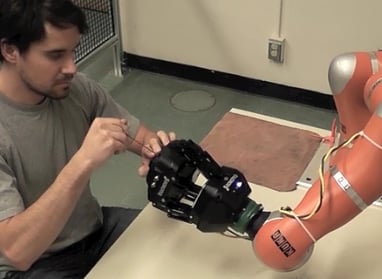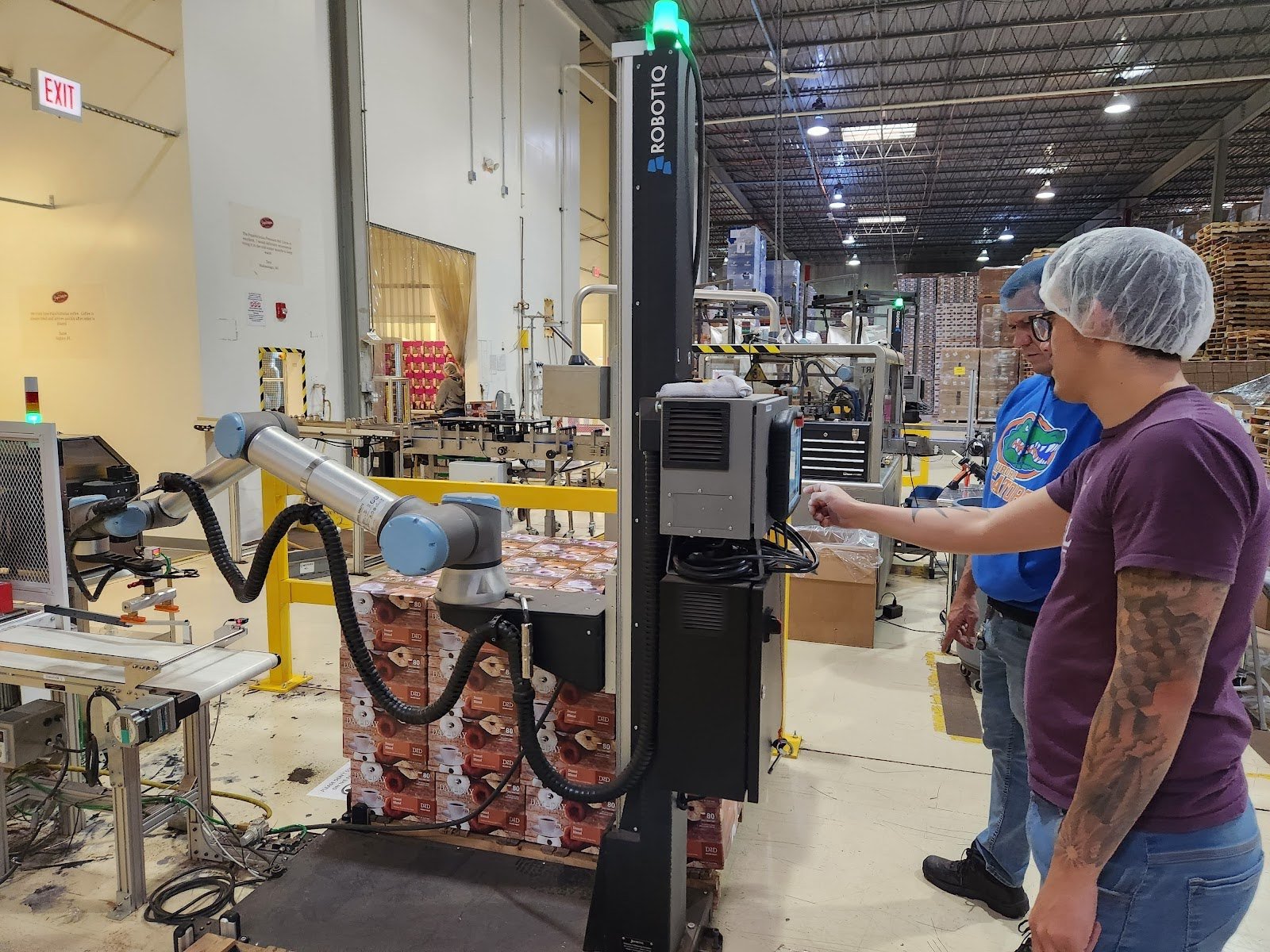What to Study for a Career in Robotics?

What skills do you need to work with robots?
Which subjects should you study?
How can you start your dream career in robotics?
Since we published the first version of this article way back in 2015, it has become one of our most popular articles ever.
And, it's easy to see why.
Robots are the future. Robots are already here. Robots are everywhere!
Many people, just like you, are interested in pursuing a career in robotics.
But, how do you get started? There are so many subjects available to study these days that it's very hard to know which is the right subject that will give the head-start you need.
Let's look at the various paths you can take towards a career in robotics and the skills you'll need to be a robotics engineer.
What type of person works in robotics?
Robotics engineers are learners.
Robotics engineers are masters-of-all-trades.
Robotics engineers know a little bit about everything (at least, everything important to robotics).
They are the bridge between mechanical engineering, electrical engineering, computer science, and even psychology.
Robotics involves so much more than just "building robots". To be a robotics engineer, you have to have a whole range of different skills and areas of expertise. There are 10 essential skills that all good roboticists should have.
Of course, other jobs in robotics don't involve becoming a robotics engineer. You could be a robotics technician, a programmer, or even a robotics operator (which can be almost anyone these days). Not all of the jobs in robotics will require you to get a university degree. Some are possible with just the right core subjects at high school.
How to get started in robotics
Robotics is not a straightforward career choice. It is a truly interdisciplinary career. This makes it different from many traditional jobs.
You want to be a doctor? Study medicine.
You want to build bridges? Study civil engineering.
You want to work with robots? Well… you could study electronics, computer science, biotechnology, manufacturing, cognitive science…
… there are loads of routes to a job in robotics!
Core subjects for high school students
Let's start by looking at the high school level of study.
What is good advice for someone who's interested in robotics and needs to pick their high school subjects?
At the most basic level there are 2 core subjects which you need to get started in robotics:
- Mathematics — This is a must. You don't have to be John Nash — the famous American mathematician — but a good grasp of algebra and geometry are essential to all of the subjects which make up robotics.
- Physics (or another science) — It is important to have a solid understanding of science if you want to work in any branch of engineering. Physics is particularly useful because it provides foundational knowledge in energy, electrical circuits, mechanics, material science, and other key topics for robotics. However, all sciences are useful as they teach how to apply mathematics to real-world problems.
Other useful high school subjects
Every country has a different set of subjects that are taught in schools so it's difficult to specify a list which applies to everyone. Instead, here are 3 skills that are useful for robotics and some subjects which provide them:
- Computing and Programming — Programming is important for robotics so subjects like Computer Science and Information Systems are a great choice.
- Design and Technology —Subjects that can boost the practical side of engineering include Product Design, Graphic Communication, Technological Studies and Manufacturing.
- Specific Engineering Disciplines — Some schools provide subjects in specific engineering disciplines such as Automotive, Bioengineering, Electronics, Mechatronics and Mechanical engineering. All of these can be beneficial for aspiring roboticists.
At the college level, you might want to check out our article 6 College Majors That Produce the Best Robotics Employees.
image: mit.edu
Choosing a degree in robotics
There are 3 core disciplines within robotics: mechanics, electronics, and computer science.
At university, I chose a 5 year Masters degree in Robotics which gave equal focus to the three core areas. At the time, I figured that was the way that people get into robotics. However, I was soon to find out that my route was far from standard. Most people working in robotics had arrived through one or a combination of the following routes, through a mixture of undergraduate and graduate degree courses.
Each route places the main focus of study on a different core part of robotics:
- "The Body" - Mechanical Engineering - This branch of engineering looks at the physical systems which make up a robot. Subtopics like mechanics, materials engineering and manufacturing are core to industrial robotics. Often, mechanical engineering courses will have specialization in mechatronics or robotics, but these tend to be focused mostly on physical design and actuation.
- "The Nervous System" - Electrical and Electronic Engineering - This branch of engineering gives you the basics of electronics, embedded systems, low-level programming, and control theory. Often, electrical engineering courses will also provide specializations in robotics or automation, which will be centred around the control of robots rather than the mechanical design.
- "The Brain" - Computer Science - A lot of people in research seem to enter robotics through computer science. This trend is likely to continue as standard robotic hardware platforms become the norm. Common platforms remove the research focus from the physical hardware and instead allow researchers to concentrate on software and high-level programming. Often, these courses will include robotic programming topics such as Artificial Intelligence and Software Design. It is usually at this level of study where people with a background in psychology and related fields can enter robotics with a postgraduate Masters course.
These are the core 3, but there are also many other routes you could take to end up working in robotics.
For example, just take a look at the top 25 women in robotics and you'll find people who have started out studying:
- Physics (e.g. Aude Billard from EPFL and Arianna Menciassi from Scuola Superiore Sant’Anna)
- Cognitive Science and Psychology (e.g. Leila Takayama from Google X)
- and even Sociology and Social Psychology (e.g. Astrid Weiss from Vienna University of Technology).
Other big names in robotics have also started from degrees such as:
- Pure Mathematics (e.g. Rodney Brooks from MIT)
- Law (e.g. Ryan Calo from UW School of Law)
- and Civil Engineering (e.g. Raj Reddy winner of the Turing Award).
Whatever path you choose, make sure you continue to develop your knowledge in all of the other areas as well. Of course, you are never going to be a leading expert in all of the sub-fields of robotics, but developing yourself into a competent computer scientist, electrical engineer and mechanical engineer will put you in a great position when you continue to specialize throughout your career.
How to choose the right robotics degree for you
Many people have commented on this article since we first published it. A lot of those comments fundamentally ask the following question:
"Which university degree should I choose?"
While I always appreciate hearing about people's interest in robotics, the basic answer to this question is: "I don't know which degree you should choose."
As you've seen, there are many degrees which could give you an entry into robotics. You need to pick the one which best suits your interests. The answer will also depend on what courses are available in your part of the world.
To help you out in your decision, I have written 2 follow-up articles:
- How to Pick a Robotics Degree Course: Which Specialism? — This article provides an exercise you can use to find out which area of robotics you are most interested in.
- How to Pick a Robotics Degree: Top 3 Questions Answered — This answers the 3 most common questions I get asked about how to pick the best degree for your needs.
If you're still stuck, please read other people's comments on this post and my answers to them. You can learn a lot from them!
The vital importance of extracurricular fiddling
Whatever you study, there is one aspect of robotics training that is often neglected.
Take a look at the NASA Career Corner and you will some great advice from robotics professionals on how to get started in robotics. Many of them recommend getting some extracurricular hands-on experience with robots throughout your education.
I call this "extracurricular fiddling."
Getting physical experience fiddling with robots, electronics, programming and mechanics is essential to truly understand the theories of robotics. It also allows you to find out which areas of robotics you are really most interested in.
Robot kits, like Lego Mindstorms, are a good place to start playing with robotics at home, as are embedded systems like Raspberry Pi.
One of the best ways to get hands-on experience is to enter one of the many robotics competitions, which are available for various age and education levels. If you know other people who are interested in robotics, why not get together a team and enter one?
There really are many ways to get started in robotics. The key thing is to supplement your knowledge with hands-on activities and keep learning!
What advice would you give to someone who wanted to get started in robotics? Do you have any questions about how to begin? How did you get started in robotics? Tell us in the comments below.
If someone you know is interested in a career in robotics, please pass them the link to this post. Thanks.











Leave a comment